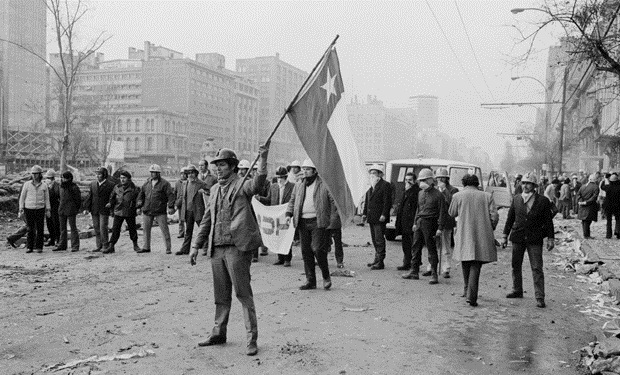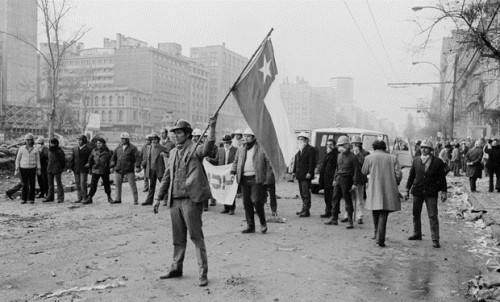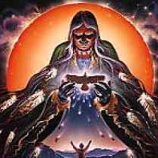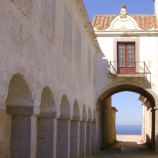9/11/2013 – Chile, 40 years after the military coup – part II

To the editors,
As forty years have passed since the military coup in Chile, I send this news article that was published by La Tercera, Santiago de Chile, which I translated. The article is extensive, so I am sending it in three parts.
Raul Sanchez
The United States: The Eyes and Talons of the Eagle
On Monday the 20th of August, 1973, members of the Forty Commission of the United States government sanctioned an unconditional loan of one million dollars to the opposing political parties as well as the committees for commercial and on-land transport movements, who were on strike at that time. The Forty Commission members organized high level global anticommunist activity led by the government, the Pentagon, and the CIA. The chairman was the National Security Advisor to President Richard Nixon, Henry Kissinger.
Evidence regarding the width and breath of the White House’s destabilizing intervention in Chile was the object of speculation until 1975, when a Senate committee led by Democrat Frank Church, began revelations with the official report entitled Covert Action in Chile from 1963 to 1973. With the initiative of President Bill Clinton, a new declassification report was revealed in 1999. This was expanded in 2000 with the Hinchey Report on CIA activities which amounted to 25,000 declassified U.S. documents on Chile, as well as recordings and memoirs of numerous protagonists from that period. This huge accumulation of information reveals how Washington gave disproportionate attention to Chile in relation to its size and significance in the political arena.
The most dramatic chapter of this intervention was recorded before Salvador Allende took the presidency, between September and November of 1970. President Nixon was enraged to hear of Allende’s triumph, and took it in a very personal way “That son of a bitch! That bastard!” he said, as he slammed his fists on the presidential desk of the Oval Office in the White House on October 15, 1970. Nixon, who had harshly criticized the Kennedys for allowing the consolidation of Fidel Castro in Cuba, believed that Allende’s congressional ratification process should be impeded because more than 60% voted for other candidates. Kissinger’s perception was worse, according to his colleague at the Department of National Security, Roger Morris: “I don’t believe that anyone in government office was as ideological as Kissinger was regarding Chile(…) Disastrous events were happening at that moment all around the world, but Chile was the only one that really worried Henry.”
The instructions Nixon gave to Kissinger and CIA Director Richard Helms was categorical: a plan within 48 hours. Helms’ notes recorded Nixon’s position:
– “It may be a one in ten chance, but save Chile!”
– “Money is not an object.”
– “I don’t care what it takes. Take whatever risk necessary.”
– “Have $10,000,000 available, and more if necessary.”
– “Get the best men we have.”
– “Make the economy howl.”
Kissinger later categorized these efforts as “belated and confused.” Attempts by corrupt parliamentarians to support congressional votes in favor of the election of Jorge Alessandri were made in order for Eduardo Frei to step forward in a new election, swearing the anticommunist vow. Attempts were made to produce a military coup through the Fubelt project (Fu was the code for Chile), an idea that was derived from the attempted kidnapping and assassination of army commander and chief, General Rene Schneider. They tried to intervene until the very last moment in the Chilean Armed Forces, until Kissinger himself relinquished these initiatives.
The Schneider crime generated a reverse effect and the Christian Democratic Party, subjected to strong centrifugal pressures at the time, finally recognized Allende’s relative majority vote after imposing a “state of constitutional guarantees.” Allende was anointed President by Congress without a single rightwing vote. Washington was staring failure in the eyes.
But why all this exaggerated preoccupation from the United States? At first it appeared to be due to purely economic reasons. The Unidade Popular government expropriated the International Telegraph and Telephone, ITT, the monopolist telecom company that had a hand in the conspiracy against Allende, and in 1971 nationalized the country’s giant copper industry, by unanimous Congress votes, without compensation. The most affected company, Kennecott, took Chile’s copper business all over the world in the following years. But formally, official trade and credit programs between the United States and Chile remained without any significant variations.
In other words, economic motives were not a foremost concern to the White House. The main reason was a different one; the Unidade Popular included the Communist Party. This was not evident to the Chilean government until December 1972, when during Allende’s visit to the UN, U.S. Ambassador George H. Bush suggested opening a high-level formal negotiation. Shortly thereafter, seven representatives of the Chilean government and seven Department of State members met in Washington to discuss the issue of compensation for the expropriated companies.
According to one Chilean participant in the meeting, commissioner for the Christian Left Wing party, Luis Maira “It was an aimless ploy, to not leave the administration with their hands in their pockets.” The President of the Soviet Union had made it clear upon his visit that Moscow would not offer any aid, and talks with the Paris Club about debt were progressing very slowly. Meanwhile, Chile tried to fulfill its internal commitments regarding their issuing of a new domestic currency, which skyrocketed inflation. As such, negotiations with the United States were, even if unfruitful, indispensable.
The Chilean delegation was led by Ambassador Orlando Letelier. After two days without progress, during a short interval, the Secretary of State, William Rogers and Henry Kissinger invited Letelier to a private meeting which lasted nearly an hour. Rogers asserted that Washington would not budge on two points: the cutbacks justified by the “excessive” profitability of nationalized companies, which led to not paying them anything.
Then Kissinger spoke about the second point in question: “Latin America is a region with little to no importance to us… Chile has no value on a strategic standpoint. We can get copper from Peru, Zambia and Canada. You have nothing that is decisive. But if you continue on this path to socialism that Allende is all about, we’re going to have serious problems in France and Italy where socialists and communists are divided amongst each other, but with this example could join forces. And that substantially affects the interests of the United States. We will not allow them to succeed. You can count on it.”
It was the second warning that Allende had received of the kind. The first had come when he was elected president and still had no congressional approval. The diplomat Armando Uribe had reported to the Chancellor of Eduardo Frei, Gabriel Valdés, information given by journalist Irving Stone, which follows: – At a meeting in Chicago with editors of the Chicago Tribune, The Washington Post and The New York Times, Kissinger had explained that the problem with Chile was not just concerning economic interests in Latin America, but the antecedent that the election signified to the Left-wings in France and Italy. The PC was the final problem, despite being the most moderate among the coalition, and Leonid Brezhnev’s Soviet Union in a non-aggressive stance in the Third World, in a period of “détente”, with diplomatic talks amid high tensions. The eyes of the North American eagle were in many latitudes.
In August 1973, it seemed that the one million dollar delivery to the Chilean opposition would be the last and decisive step. Precise CIA information suggested as such. On September 7th, an on location CIA office warned of a joint action of the three armed forces. On the ninth, undercover agent Jack Devine said “It will happen on the 11th.”
Related Articles













